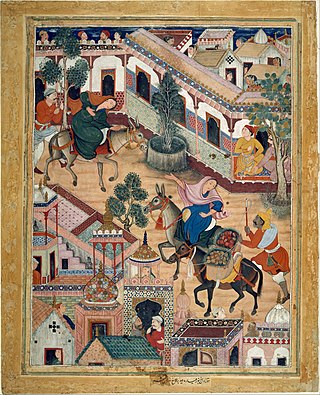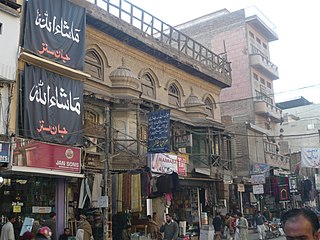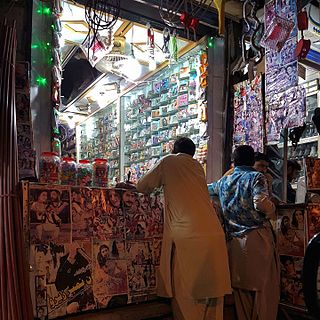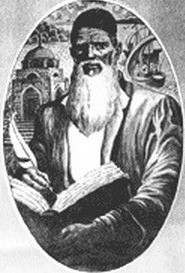Related Research Articles

The Hamzanama or Dastan-e-Amir Hamza narrates the legendary exploits of an Arab warrior named Hamza, usually mistaken for Hamza ibn Abdul-Muttalib, an uncle of Muhammad. Most of the stories are extremely fanciful, "a continuous series of romantic interludes, threatening events, narrow escapes, and violent acts". The Hamzanama chronicles the fantastic adventures of Hamza as he and his band of heroes fight the enemies.

The Yusufzai or Yousafzai, also referred to as the Esapzai, or Yusufzai Afghans historically, are one of the largest tribes of ethnic Pashtuns. They are natively based in the northern part of Khyber Pakhtunkhwa, to which they migrated from Kabul during the 16th century, but they are also present in smaller numbers in parts of Afghanistan, including Kunar, Kabul, Kandahar and Farah. Outside of these countries, they can be found in Ghoriwala District Bannu, Balochistan Sibi (Akazai), Chagai (Hassanzai) and Rohilkandh.

Heer Ranjha is one of the four popular tragic romances of the Punjab. The other three are Mirza Sahiban, Sohni Mahiwal and Sassi Punnun. There are several poetic narrations of the story; the most famous being Heer by Waris Shah written in 1766. It tells the story of the love between Heer Sial and Dheedo Ranjha.
Adam Khan and Durkhani is a classic Pashtun romance which has been called the Pashto Romeo and Juliet along with Yusuf Khan and Sherbano.

The Qissa Khwani Bazaar is a bazaar in Peshawar, the capital of the Khyber Pakhtunkhwa province of Pakistan.

The Pashto media includes Pashto literature, Pashto-language newspapers, magazines, television and radio stations, as well as Pashto films and Pashto internet. Pashto media involves the Pashtuns of Pakistan, Afghanistan and the Pashtun diaspora around the world.

Pashto cinema, refers to the Pashto-language film industry of Pakistani cinema based in Peshawar, Khyber Pakhtunkhwa, Pakistan.

Ustad Khyal Muhammad is a Pashtun singer from Khyber Pakhtunkhwa, Pakistan. He has appeared regularly on television, usually singing ghazals and in movies.

Alam Lohar was a prominent Pakistani Punjabi folk music singer. He is credited with creating and popularising the musical term Jugni.
Yousuf Khan Sher Bano was the first-ever Pashto film released in Pakistan. It was released on 1 December 1970. It was directed by Aziz Tabassum and produced by Nazir Hussain, with debut stars Yasmin Khan and Badar Munir.

Qul Ghali was a famous Muslim Volga Bulgarian poet. His most famous poem is Qissa-i Yusuf, written in the Old Tatar language, which is not mutually intelligible with the modern Tatar, Bashkir and Chuvash languages.
Yousaf Khan or Yousuf Khan may refer to:
Ismaila is a town and Union Council of Swabi District in the Khyber-Pakhtunkhwa province of Pakistan. It is located at 34°13'0N 72°15'0E
Turlandi is a village near Shewa Adda and a Union Council in Swabi District of Khyber-Pakhtunkhwa, Pakistan.
Son of a Lion is a 2007 Australian-Pakistani drama film set in Darra Adam Khel, in Pakistan's Khyber Pakhtunkhwa province. The film tells the story of Niaz Afridi, a Pashtun boy who wants to go to school instead of carrying on the family business of manufacturing firearms. The director, Benjamin Gilmour, is an Australian former paramedic; Son of a Lion is his first film. It was filmed in the area around Darra with the cooperation of local residents. The actors are local non-professionals and much of the dialogue is improvised. It has received generally positive reviews. The film is in Pashto with English subtitles.
Mashwani (also Mishwani, Meshwani, Moshwani) is Arab origin tribe mainly settled in different parts of Pakistan and Afghanistan, in addition to some other neighboring regions. They are Afghans by adoption and Arabs by descent. They use Mashwani, Banuri, Ludin, Kazmi, Roghani, Jafari as their surnames. Mashwanis played a vital role in fighting against Sikh Khalsa army.
Pathans in India are citizens or residents of the Indian Republic who are of ethnic Pashtun ancestry. "Pathan" is the local Hindi-Urdu term for an individual who belongs to the Pashtun ethnic group, or descends from it. The term additionally finds mention among Western sources, mainly in the colonial-era literature of British India. Historically, the term "Afghan" was also synonymous with the Pathans. The Pathans originate from the Eastern Afghanistan and Northwestern Pakistan regions, ethnolinguistically known as Pashtunistan.
Shamshad known by her alias Yasmeen Khan was a Pakistani actress. She was a popular actress who starred in many Pashto films. She was murdered on 15 April 1999.
References
- ↑ Hanaway, William L. "Dastan" in Claus, Peter J., Sarah Diamond, and Margaret Ann Mills. South Asian Folklore: An Encyclopedia: Afghanistan, Bangladesh, India, Nepal, Pakistan, Sri Lanka. Taylor & Francis, 2003. p143
- 1 2 Bibi Jaan, Yousaf Khan aw Sher Bano, Sahar, The Voice of Pashtuns, January 2011, p19-24 accessed February 17, 2017 at http: www.khyberwatch.com/Sahar/2011/Sahar-Jan-2011.pdf
- ↑ Khaliq, Fazal (2013-11-26). "Silver screen romance: Cameraman of Yousuf Khan Sherbano speaks of film industry's glory days". The Express Tribune. Retrieved 2022-03-13.
- 1 2 3 4 Heston, Wilma L. Footpath Poets of Peshawar. in Appadurai, Arjun, Frank J. Korom, and Margaret Ann Mills. Gender, genre, and power in South Asian expressive traditions. Motilal Banarsidass Publishers, 1994. p310-311, 326-327
- ↑ Heston, W. L. "Verse Narrative from the Bazaar of the Storytellers." Asian folklore studies (1986): 79-99.
- ↑ "Actor Badar Munir passes away". DAWN.COM. 2008-10-12. Retrieved 2022-03-13.
- ↑ Parvez, Dr. Amjad (2018-07-27). "Lal Mohammad Iqbal — the forgotten hero duo". Daily Times . Retrieved 2022-06-21.